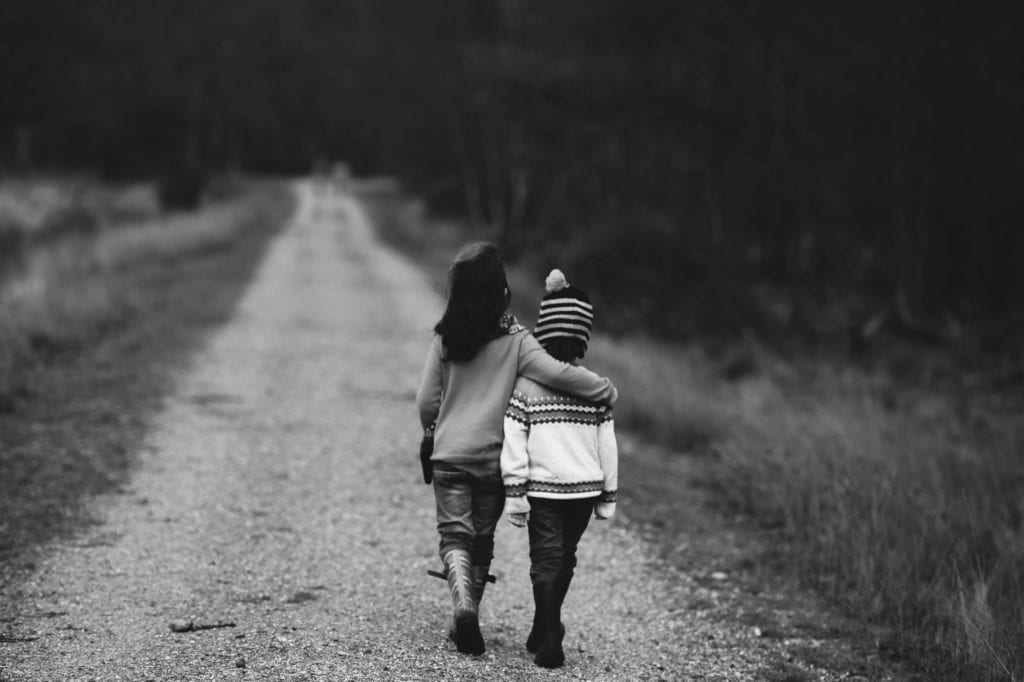
“Life might prove difficult—was evidently going to; but meanwhile they had each other, and that was everything.”
—Henry James
Before I Knew
I meet John at the gym one Monday morning. It’s 6 a.m., and both of us have a cup of coffee in our hand and sleepiness in our eyes.
My wife Tracey and our daughters, Meredith and Holly, have given me personal training sessions as a Father’s Day gift. I’ve worked out religiously for decades, since I was a teenager, in fact, but I’m mostly self-taught and have never worked with a personal trainer.
When we shake hands, the veins in John’s right biceps pop out like a small train tunnel, temporarily altering the multicolored pattern of tattoos that cover his entire arm. Pleasant but not enthusiastic, he appears mid-twentyish and has a wide smile that pushes out from his heavy beard.
We spend a few minutes going over the program he’s put together for me after our initial consultation the previous week. I then warm up by joining two dozen others on rows of elliptical machines, all of us pursuing better fitness and most, I suppose, hoping to fend-off the effects of years. Ten minutes later, John returns and begins leading me through a series of exercises.
Most are familiar and I can complete them without too much effort; after all, I’ve always been athletic.
Then, we get to the walking lunges.
When I lung forward with my right leg, I feel shaky and off-balance. Though subtle, I sense it. I think I must need a longer warm-up, so I jog in place and stretch my legs—first, my hamstrings, then my quadriceps—and I keep reattempting the lunges, trying to compensate for the wobbliness each time I step out with my right leg.
As I lunge, sway, and jerk to recover and realign myself, I look like a young horse learning to walk. After a couple of additional wobbly attempts, I look back at John.
“See what you have to look forward to?” I say.
He smiles. “Keep going!” he says.
“Approaching fifty isn’t for the faint of heart!” I say.
He pushes out a one-syllable chuckle while nodding his head.
“You’ll want to keep working on those lunges,” he says.
“You think?” I say.
This makes him laugh.
After a few more unsteady attempts, we move to another exercise, and then to several others, and I continue to meet with him until I finish my six sessions.
The wobbling continues.
John says nothing more about it.
I attribute it to my pushing fifty.
Months later, I would learn I have Parkinson’s disease.
A few months after that, I would learn that John had died.
By suicide.
Now that I Know
With the gift of hindsight, I wish I could go back to my last training session with John and say something like this.
I’ll soon learn that I have Parkinson’s disease, John, and its burdens will be my life struggle.
My wife Tracey often reminds me that at any moment in time we can rightly assume that people we know and love, as well as those we’ve just met, face difficulties in their lives. Whether they share it or not, and even when smiles cover sadness, or humor hides fear, or work numbs pain, the struggles are there—real, hard, and sometimes life threatening.
You’d have to know her to appreciate this fully, but Tracey says, “Everyone has their sh%t!”
Maybe it’s a relationship, or finances, or a job, or Parkinson’s or depression, or some other hardship, but everyone has their sh%t!
Or they will.
But what we also have, and we don’t always know it, is a chance for connection. I wish I could have offered you more connection in the struggle, and that maybe you could have done that for me, too, once I knew what I would be dealing with. I know there is no guarantee that things would have been different. But I do know there is a chance that the more willing we are to share the dark places and our hardships, the more likely it is we can find some light.
John, we need one another.
We need to give and receive offers of kindness and compassion, in words and gestures. Sometimes we need to forgive or to be forgiven. We need to let go of harsh critiques and judgment, of others and of ourselves. We need to give each other the benefit of the doubt, see one another through appreciative eyes, and see ourselves in a similar way. We need to remind ourselves that we’re all in this life together, as sh%t-filled as it gets.
We have each other.
The next time I’m at the gym, I’ll do some walking lunges and think about John.
_______
[1] Henry James, The Wings of the Dove (New York: Charles Scribner’s Sons, 1902), 69.
Photo: Photo by Annie Spratt on Unsplash
Allan Cole is a professor in The Steve Hicks School of Social Work at The University of Texas at Austin and, by courtesy, professor of psychiatry in the Dell Medical School. Diagnosed with Parkinson’s in 2016, at the age of 48, he serves on the Board of Directors at Power for Parkinson’s, a non-profit organization that provides free exercise, dance, and singing classes for people living with Parkinson’s disease in Central Texas, and globally via instructional videos. He also serves as a Community Advocate for ParkinsonsDisease.net, writing columns about living well with Parkinson’s. He is author or editor of 10 books on a range of topics related to bereavement, anxiety, and spirituality. Currently, he is writing a book on counseling people with Parkinson’s disease, which will be published by Oxford University Press.
Follow him on Twitter: @PDWise
